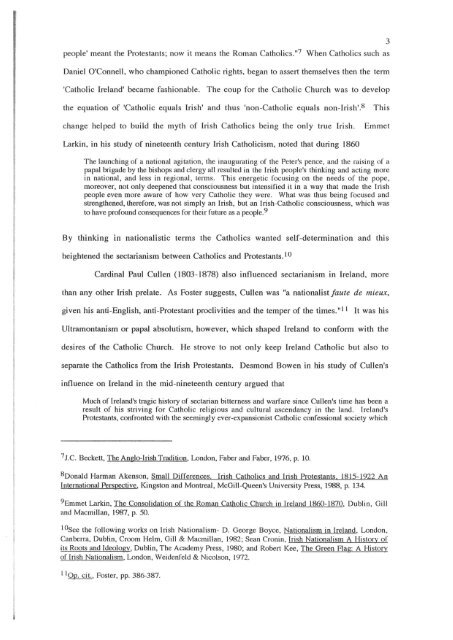TRANSPLANTED IRISH INSTITUTIONS - University of Canterbury
TRANSPLANTED IRISH INSTITUTIONS - University of Canterbury
TRANSPLANTED IRISH INSTITUTIONS - University of Canterbury
Create successful ePaper yourself
Turn your PDF publications into a flip-book with our unique Google optimized e-Paper software.
3<br />
people' meant the Protestants; now it means the Roman Catholics. "7 When Catholics such as<br />
Daniel O'Connell. who championed Catholic rights. began to assert themselves then the term<br />
'Catholic Ireland' became fashionable. The coup for the Catholic Church was to develop<br />
the equation <strong>of</strong> 'Catholic equals Irish' and thus 'non-Catholic equals non-Irish'.8<br />
This<br />
change helped to build the myth <strong>of</strong> Irish Catholics being the only true Irish.<br />
Emmet<br />
Larkin. in his study <strong>of</strong> nineteenth century Irish Catholicism. noted that during 1860<br />
The launching <strong>of</strong> a national agitation, the inaugurating <strong>of</strong> the Peter's pence, and the raising <strong>of</strong> a<br />
papal brigade by the bishops and clergy all resulted in the Irish people's thinking and acting more<br />
in national, and less in regional, terms. This energetic focusing on the needs <strong>of</strong> the pope,<br />
moreover, not only deepened that consciousness but intensified it in a way that made the Irish<br />
people even more aware <strong>of</strong> how very Catholic they were. What was thus being focused and<br />
strengthened, therefore, was not simply an Irish, but an Irish-Catholic consciousness, which was<br />
to have pr<strong>of</strong>ound consequences for their future as a people. 9<br />
By thinking in nationalistic terms the Catholics wanted self-determination and this<br />
heightened the sectarianism between Catholics and Protestants. I °<br />
Cardinal Paul Cullen (1803-1878) also influenced sectarianism In Ireland. more<br />
than any other Irish prelate. As Foster suggests. Cullen was "a nationalist faute de mieux.<br />
given his anti-English. anti-Protestant proclivities and the temper <strong>of</strong> the times." II It was his<br />
Ultramontanism or papal absolutism. however. which shaped Ireland to conform with the<br />
desires <strong>of</strong> the Catholic Church. He strove to not only keep Ireland Catholic but also to<br />
separate the Catholics from the Irish Protestants. Desmond Bowen in his study <strong>of</strong> Cullen's<br />
influence on Ireland in the mid-nineteenth century argued that<br />
Much <strong>of</strong> Ireland's tragic history <strong>of</strong> sectarian bitterness and warfare since Cullen's time has been a<br />
result <strong>of</strong> his striving for Catholic religious and cultural ascendancy in the land. Ireland's<br />
Protestants, confronted with the seemingly ever-expansionist Catholic confessional society which<br />
7 J.e. Beckett, The Anglo-Irish Tradition, London, Faber and Faber, 1976, p. 10.<br />
8Donald Harman Akenson, Small Differences. Irish Catholics and Irish Protestants. 1815-1922 An<br />
International Perspective, Kingston and Montreal, McGill-Queen's <strong>University</strong> Press, 1988, p. 134.<br />
9Emmet Larkin, The Consolidation <strong>of</strong> the Roman Catholic Church in Ireland 1860- 1870, Dublin, Gill<br />
and Macmillan, 1987, p. SO.<br />
I OSee the following works on Irish Nationalism- D. George Boyce, Nationalism in Ireland, London,<br />
Canberra, Dublin, Croom Helm, Gill & Macmillan, 1982; Sean Cronin, Irish Nationalism A History <strong>of</strong><br />
its Roots and Ideology. Dublin, The Academy Press, 1980; and Robert Kee, The Green Rag: A History<br />
<strong>of</strong> Irish Nationalism, London, Weidenfeld & Nicolson, 1972.<br />
I lOp. cit., Foster, pp. 386-387.
















